|
|
|
Sort Order |
|
|
|
Items / Page
|
|
|
|
|
|
|
| Srl | Item |
| 1 |
ID:
134170
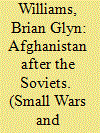

|
|
|
|
|
| Publication |
2014.
|
| Summary/Abstract |
In 1989 the Soviet Union withdrew its forces from Afghanistan leaving the embattled Afghan Communist government of President Mohammad Najibullah to fight against an emboldened mujahideen insurgency. Most experts expected a quick mujahideen victory once the Soviets were no longer directly involved in counterinsurgency operations in support of the Afghan government. But in the spring of 1989 the Afghan Communists beat the odds and defeated a mujahideen rebel offensive designed to capture the eastern city of Jalalabad. This proved to be a turning point, and for the next three years the Najibullah regime held out against the mujahideen 'freedom fighters'. In fact the Afghan Communist regime actually outlasted its sponsor the Soviet Union. The reasons for this remarkable achievement can be traced, in part, to ethnic-tribal divisions among the quarreling mujahideen parties and the Afghan government's ability to exploit them. This largely untold story has obvious implications for understanding the future of post-Karzai Afghanistan, tribalism, ethnicity, and foreign sponsorship in post-US Afghanistan. This article will explore the reasons for the resilience of the Najibullah Communist government and then assess possible implications for a post-2014 Afghan government.
|
|
|
|
|
|
|
|
|
|
|
|
|
|
|
|
| 2 |
ID:
146799
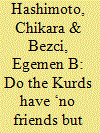

|
|
|
|
|
| Summary/Abstract |
A Kurdish proverb says that the Kurds have ‘no friends but the mountains’. This was not what the Turkish authorities believed. Using new and previously unexploited archives both in English and Turkish, this article offers a new interpretation of Turkey's perception of the Kurds. By analyzing Kurdish activities and their alignment with Communist movements and Soviet activities, it shows how Turkey's threat perception was shaped by international contexts, especially through the Cold War. In addition, the Kurdish nationalist movement in the Middle East played a pivotal role in regional intelligence cooperation between Turkey, Iraq and Iran. This article argues that Soviet and Communist activities had an important role in shaping Turkey's threat perception of the Kurdish minority in the country. Turkey's perception of subversive threats involved an intertwining of Communists, Soviets and Kurds. This affected the Kurdish bid for independence for most of the twentieth century.
|
|
|
|
|
|
|
|
|
|
|
|
|
|
|
|
| 3 |
ID:
110217
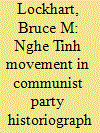

|
|
|
|
|
| Publication |
2011.
|
| Summary/Abstract |
The significance of the High Tide of 1930-31 lies not only in its impact on the evolution of the Vietnamese Revolution, but also in its status as a microcosm of policy debates and personality conflicts within the Indochinese Communist Party. This article looks at how the evolution of the Party's historiography of 1930-31 can be analysed in terms of broader political developments in Vietnam, such as struggles over ideology and the growing leadership role of Hô Chí Minh.
|
|
|
|
|
|
|
|
|
|
|
|
|
|
|
|
| 4 |
ID:
106883
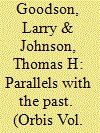

|
|
|
|
|
| Publication |
2011.
|
| Summary/Abstract |
This article assesses seven startling and unsettling similarities between Soviet strategies and tactics in Afghanistan during their Afghan war of 1979-1989 and American coalition strategies and tactics in Afghanistan since October 2001. It concludes with the implications of this dynamic. In particular, the similarities between Soviet and U.S. approaches to Afghanistan that focus on key population centers, reconciliation/reintegration, and the development of "Afghan" solutions to a variety of security concerns are extremely disturbing and, we believe, should be the focus of national attention and debate.
|
|
|
|
|
|
|
|
|
|
|
|
|
|
|
|
| 5 |
ID:
180026
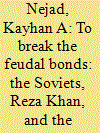

|
|
|
|
|
| Summary/Abstract |
From 1921-25, the USSR normalized its relations with Iran, withdrawing support from the Soviet Socialist Republic of Iran in the northern province of Gilan (SSRI, 1920-21), and signing the Irano-Soviet Treaty of Friendship in February of 1921. Thus far, most scholarship has argued that material interests, and especially Soviet designs on Iranian oil, compelled their anti-revolutionist turn in Iran. This article, which draws upon original collections from the Archive of Foreign Policy of the Russian Federation (AVPRF) and others, argues that the defeat of the SSRI did not mark the final Soviet attempt to socialize Iran, but rather the first of several that recruited leftist parties, tribal actors, and even the Shi‘ite clerical establishment until 1923. Secondly, this article argues that the Soviets eventually threw their support behind Reza Khan not only because some senior policymakers believed that his modernizing authoritarianism would provide the preconditions for Iranian socialism, but also because of a growing hostility to the Iranian left, whose revolutionary designs the Soviets eventually deemed premature. These findings are supported by archival diplomatic reports and communiques, which the author employs to interrogate the knowledge production intended by the Soviets to justify their anti-revolutionist turn in Iran.
|
|
|
|
|
|
|
|
|
|
|
|
|
|
|
|
|
|
|
|
|